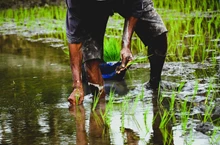
In 2013, Rohit Shelatkar came across several news reports on the increasing number of farmers’ suicides in the state of Maharashtra. In fact, between 2003 and 2013, there were almost 55000 farmer deaths. The primary reason? It was the high number of debts they had to pay. Understanding this concern, he felt it imperative to help farmers and their families. And so, he started the Grand Maratha Foundation. He aimed to do something about this situation with the farmers and their families. Moreover, in 2013, he chanced upon the Yavatmal district to meet the suicide-affected farmer families to get first-hand information about the issue.

Eventually, with a belief built on pure facts, Shelatkar began to act upon the grieving situation to find a long-term sustainable solution. And so, he established the Grand Maratha Foundation. At present, his non-governmental organization is active in remote areas of Akola, Yavatmal, Vidharbha, and Latur catering to the needs of the underprivileged farmer widows and their children. The venture is involved in providing financial help and giving the best education to farmers' kids for starting allied activities in the agrarian and rural sectors.
“We also provide the families with new skills, equipment, farming education, and more. One of the key challenges that we observed is that there is minimal local government support. Hence, as an organization, we are constantly working towards achieving a dual approach where the local government bodies are also involved with us to reach a larger farmer population,” says Shelatkar.
The Grand Maratha Foundation, as a part of the Vidarbha Farmers Empowerment Project, has conducted food and seed distribution drives. Moreover, with the Kisan Pragati Melawa, farmers were provided with key information on ‘Shendriya Sheti’ (organic farming) and ‘Paryayi Sheti’ (alternative farming), which are lucrative markets. This initiative emphasized the need to turn back to ‘organic’ farming, instead of the current chemical-based farming. The venture also created the awareness that while chemical-based farming is more convenient and generates crops faster and more easily, it will have a huge repercussion on human life (owing to chemical-infested food). Further, it will also affect the farms and make them unfit for the next generation to grow crops.
Apart from the above, the organization held Vatvruksha Karyashaal with Mahila Bachatagat in which 60 artisans and craftswomen were introduced to the concepts and methods of marketing their textile products to bigger markets such as Tier-I and Tier-II cities.
The organization also conducted a Help and Empowerment Training Camp at Kolam Tribal Pod, Tad Umari, to disburse relief and help the tribal people, especially those who are physically handicapped. Currently, Shelatkar is working towards new projects such as solar water pumps and solar electricity.
“I feel that I am a social changemaker rather than an entrepreneur because of the pure passion, leadership, and understanding of the work towards a larger vision,” he says. Recently, his non-governmental organization adopted a village named Maregaon where the construction of a canteen facility was undertaken at the Z.P. School from Tehsil Pandharkavda, a district of Yavatmal.
Sharing his advice for those willing to become social changemakers, Shelatkar says, “Not only do your research to find the right direction for your donations but go out and help in any small way. One can also volunteer by providing free education to children and donating food, clothes, and more. The goal is to give education to farmers that cover the right pricing and efficient distribution to modern techniques for creating better livelihoods.”










